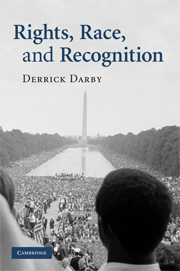1 - Having rights
Published online by Cambridge University Press: 20 January 2010
Summary
The history of humanity is rife with moral atrocities. State-sponsored ethnic cleansing and chattel slavery are especially poignant examples. In a graphic description of the former in Dostoevsky's The Brothers Karamazov, the Turks are reported to have burnt Slav villages, raped Slav women and children, nailed prisoners by their ears to fences, cut unborn children from the womb, and to have tossed babies in the air and caught them on bayonets. And a century later virtually the same script could be written to describe the atrocities committed against Bosnian Muslims by Serbian forces under Slobodan Milosevic in the former Yugoslavia: many people, including women and children, are reported to have been killed, burnt alive, tortured, and raped.
With regard to chattel slavery as practiced in the antebellum United States of America, in his autobiography Frederick Douglass vividly recalls the first time he witnessed a slave beating, a central means of maintaining order under the slave system. He provides a chilling description of how his Aunt Hester was brutally beaten by her master:
Before [the master] commenced whipping Aunt Hester, he took her into the kitchen, and stripped her from neck to waist, leaving her neck, shoulders and back, entirely naked … After crossing her hands, he tied them with a strong rope, and led her to a stool under a large hook in the joist, put in for the purpose. He made her get upon the stool, and tied her hands to the hook … after rolling up his sleeves, he commenced to lay on the heavy cowskin, and soon the warm, red blood (amid heart-rending shrieks from her, and horrid oaths from him) came dripping to the floor.
- Type
- Chapter
- Information
- Rights, Race, and Recognition , pp. 11 - 37Publisher: Cambridge University PressPrint publication year: 2009



